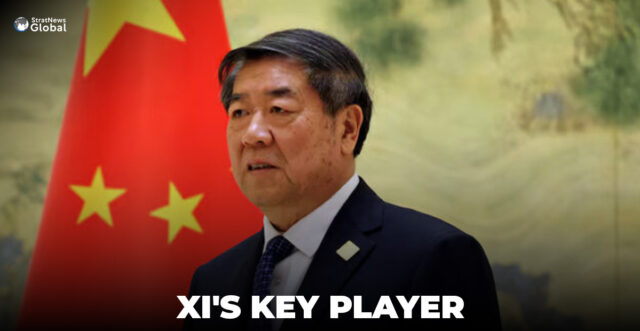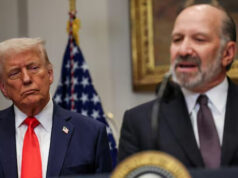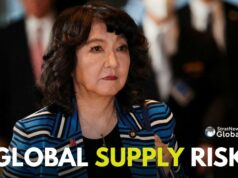At a recent business forum in Beijing, leaders from major global companies aimed to meet with Chinese President Xi Jinping, however, many were particularly impressed by Vice Premier He Lifeng, Xi’s trusted confidant and chief lieutenant, who oversees China’s economy.
U.S. President Donald Trump has urged Xi to discuss a potential trade deal after imposing 145% tariffs on Chinese goods. However, any resolution to the economic tensions will likely go through He, Xi’s Sino-American trade tsar.
Reuters interviewed 13 foreign investors and diplomats who met with Vice Premier He Lifeng over the past year. They noted his transformation from a rigid Communist Party official with limited English and a reliance on prepared speeches into a more confident, results-driven leader. He also holds significant regulatory authority over China’s financial sector.
Increased Meetings
The vice premier has held at least 60 meetings with foreigners in the past year, according to Reuters’ review of his public engagements. That marks a steady increase from 45 between March 2023, when he took office as vice premier, and March 2024.
China’s State Council did not respond to a faxed request for comment. The White House, which has since signalled a willingness to de-escalate, declined to respond to questions about its willingness to engage with He.
Trump has asserted several times that Beijing and Washington were already in trade talks and he told Time magazine in an interview published Friday that Xi had called him, without specifying when. The two leaders had spoken before Trump took office in January.
China has denied that tariff-related negotiations are ongoing, though it recently exempted some U.S. goods from retaliatory tariffs. Beijing has called on Washington to stop using threats and “extreme pressure” and requested a counterpart for potential talks.
Defender Of Status Quo?
If detailed trade talks begin, Li Chenggang, China’s chief trade negotiator, will handle daily discussions, but Vice Premier He Lifeng will oversee the talks, aimed at reducing the U.S.’s $300 billion trade deficit with China.
Despite his improved rapport with Western executives, He is not seen as a policy innovator. His enhanced reputation with American business leaders may stem from China’s perceived predictability and confidence, especially compared to the chaos in the U.S.
He last served as head of China’s key macroeconomic planning agency, where he was responsible for formulating industrial policy, and has repeatedly defended Beijing’s export-led growth strategy in meetings with foreigners.
A U.S. business person told Reuters that He, who has supported boosting manufacturing over domestic consumption, serves as Xi’s “chief lieutenant for building a trillion-dollar surplus”.
He at other meanings had also repeatedly brushed off complaints about Chinese overcapacity, which are shared by many countries that Beijing is now courting as it seeks export pressure valves and new cooperation avenues, three people told Reuters.
“On the daily level, He will be defending China’s trade surplus,” said Wen-Ti Sung, a senior fellow at the Atlantic Council’s Global China Hub. “It’s hard to see He softening down on the trade surplus, an issue pivotal to China’s job creation.”
The vice premier has been on the frontline of China’s recent outreach to developed markets like Japan and the European Union.
He will also travel to Paris next month for an economic dialogue at which French officials hope to discuss China potentially lifting tariffs on cognac imports, according to a diplomatic source.
A spokesperson for France’s economy minister did not immediately return a request for comment.
Underwhelming Start
Before He took on his current role, the economic portfolio was run by Liu He, a Harvard-educated economist with fluent English who negotiated a trade agreement with the U.S. during the first Trump administration.
While the vice premier has a PhD in economics from Xiamen University, his domestic-focused background meant he has had a learning curve in serving as China’s economic frontman to the world.
Some American executives were underwhelmed by He after the official briefed them last July on the outcome of a key economic policy meeting, according to one person present.
The person said the vice premier, who under party conventions should retire in 2027, didn’t look particularly vigorous at the briefing, where he was flanked by dozens of aides.
Predecessors of He like Liu and Wang Qishan, by contrast, were known among foreign interlocutors for their eloquence and relatively informal demeanour.
The vice premier also downplayed concerns about Beijing’s rare earth export controls and the safety of Japanese nationals in China following major stabbing events after they were raised by a Japanese business delegation in February.
‘Talking To ChatGPT’
The businessperson briefed on He’s March meetings described past discussions with the vice premier as akin to “talking to ChatGPT”. But he said the Chinese official had more recently started to communicate in a way that appealed more to Western executives.
The person, who has met He multiple times, was also impressed by the vice premier’s ability to explain Beijing’s position on economic policy and deliver on promises for assistance in a way officials who aren’t close to Xi haven’t been able to. The source did not provide specifics.
Another foreign official who met He this year also said the vice premier was very aware of China’s economic problems – which include deflationary pressures and an ageing population, on top of the tariffs and real-estate crisis – and provided a sophisticated analysis of the issues.
He also appeared very confident about the prospects of the homegrown AI startup Deepseek, the official said.
‘Typical Bureaucrat’ And Demolisher
He rose through the local bureaucracy in his native Fujian province, where Xi built his power base as a local official in the 1990s and early 2000s. He became a trusted lieutenant of Xi around that time and attended the future leader’s wedding, Reuters previously reported.
The official was transferred to the industrial port city of Tianjin in 2009, where he was nicknamed “He the Demolisher” by locals for embarking on a massive urban renewal campaign and expensive infrastructure projects that gave the city a shiny facade but also drove it deeper into debt.
Alfred Wu, a China expert at National University of Singapore, said that He focused heavily on boosting economic growth and was particularly “big on real estate and urban redevelopment, like many local officials at the time.”
Wu, who met He while working as a journalist in Fujian, described the official as a “typical local bureaucrat and a very typical protégé of Xi Jinping.”
His “number one priority is implementing Xi’s directives, which puts him in more of a subordinate position,” he added.
(With inputs from Reuters)





